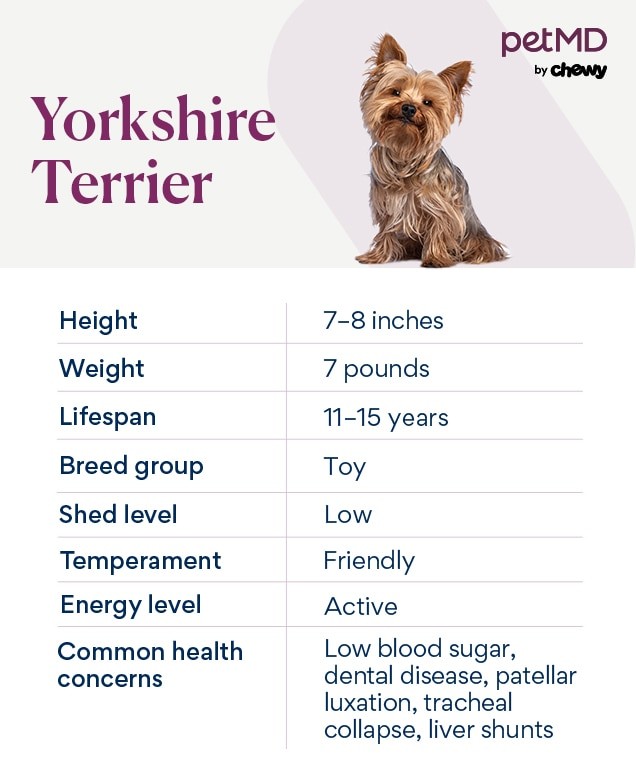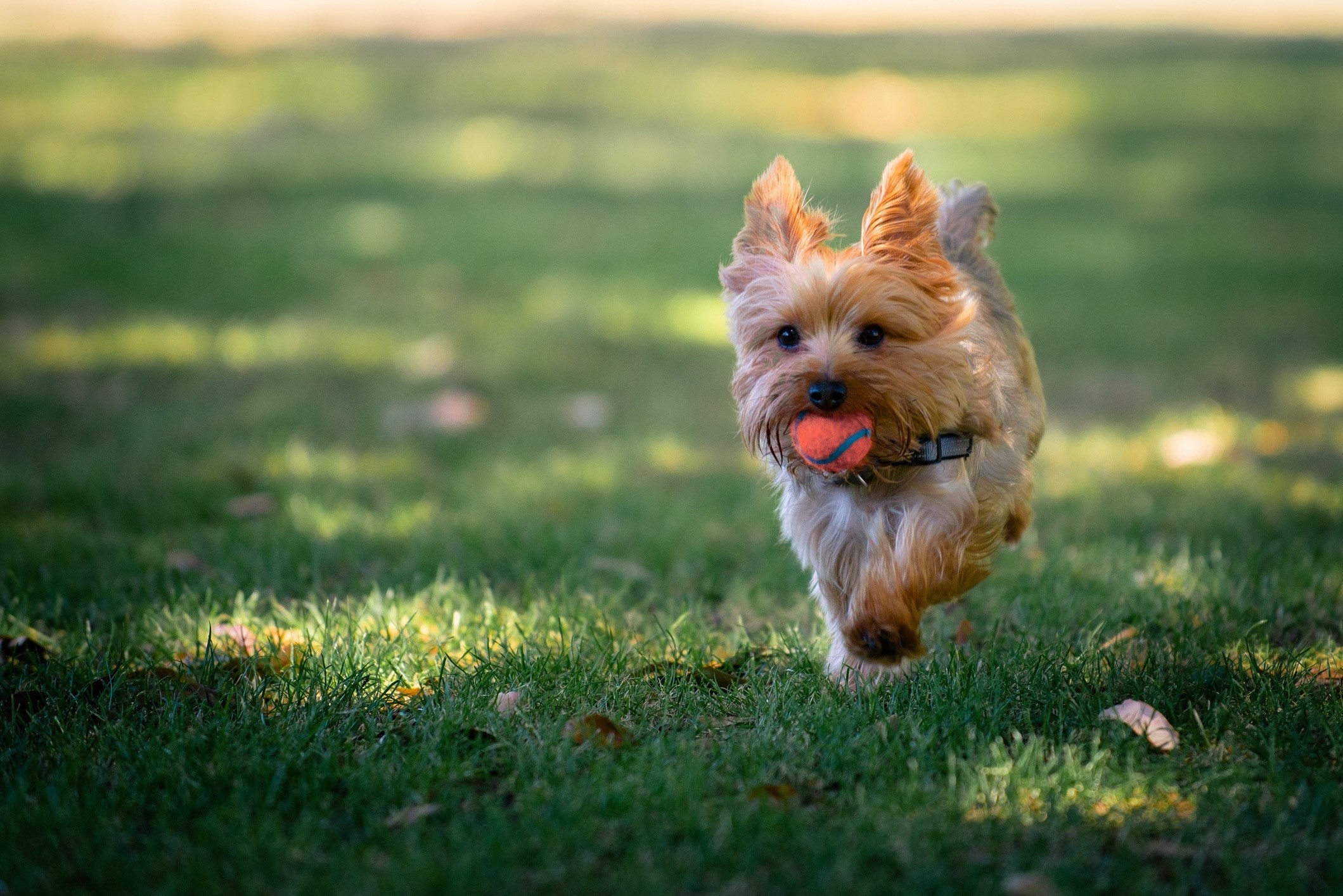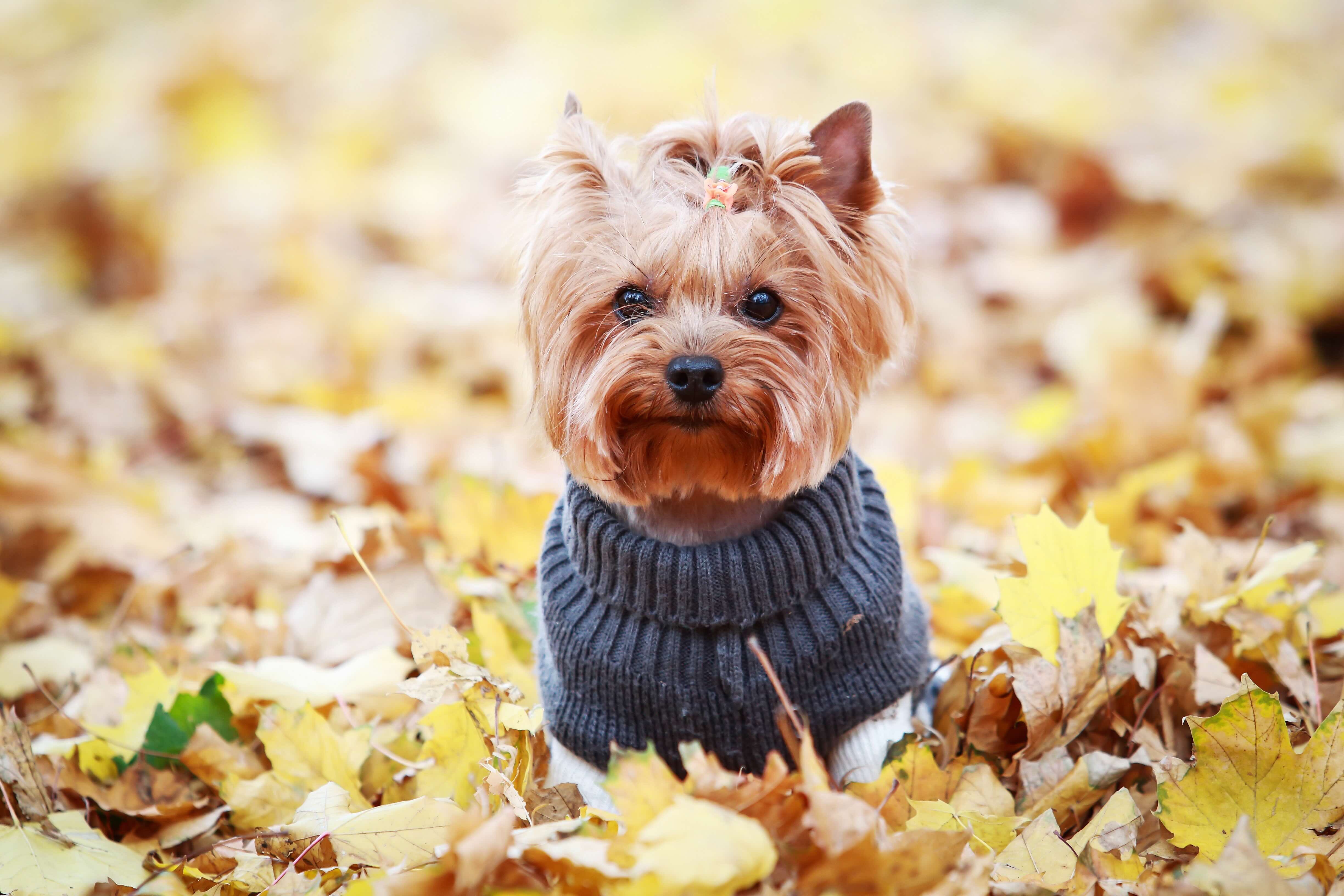Yorkies, with their playful personalities and affectionate nature, are often considered great family companions. At PETS.EDU.VN, we explore whether a Yorkshire Terrier is the right fit for your family, considering their needs, temperament, and potential health concerns. Discover expert insights to ensure a happy and healthy life for your Yorkie, and delve into the world of Yorkie care tips, Yorkie health, and Yorkie temperament.
1. Understanding the Yorkshire Terrier Breed
Yorkshire Terriers, affectionately called Yorkies, possess a unique blend of spunk and charm that captivates many pet lovers. Understanding their history and breed characteristics is essential for anyone considering bringing a Yorkie into their home.
1.1. Historical Background
Originally bred in Yorkshire, England, during the 19th century, Yorkies were employed to catch rats in clothing mills and mines. Scottish weavers who migrated to England brought along small terriers, which were then crossbred with local dogs to create the Yorkshire Terrier we know today. According to the Yorkshire Terrier Club of America, their diminutive size and fearless attitude made them ideal for vermin control.
1.2. Physical Characteristics
Yorkies are small dogs, typically standing 7 to 8 inches tall and weighing no more than 7 pounds. Their most distinctive feature is their long, silky coat, which is often a striking blue and tan color. Many owners opt to keep their Yorkie’s coat trimmed short for easier maintenance, but a full-length coat requires diligent grooming.
A detailed chart showcasing the breed standards of a Yorkshire Terrier, emphasizing their small size and distinctive coat.
2. Are Yorkies Good Family Pets? Assessing Their Temperament
One of the most important considerations when deciding whether to get a dog is understanding its temperament. Yorkies are known for their bold and affectionate personalities, but how well do these traits translate into being good family pets?
2.1. Affectionate and Playful Nature
Yorkies are generally very affectionate with their families. They enjoy cuddling and being close to their owners, making them excellent lap dogs. Additionally, they have a playful side and enjoy interactive games, which can make them fun companions for older children who understand how to handle them gently.
2.2. Potential Challenges: Bossiness and Barking
Yorkies can sometimes be bossy, often displaying a “big dog” attitude despite their small size. This can manifest as excessive barking, especially if they are not properly trained. Consistent training and socialization are crucial to manage these behaviors. It’s essential to teach them when to be quiet and to discourage excessive barking from an early age.
2.3. Compatibility with Children and Other Pets
While Yorkies can be loving family pets, they may not always be the best choice for families with very young children. Their small size makes them vulnerable to accidental injuries, and they may not tolerate rough handling. Supervision is always necessary when Yorkies interact with children. Similarly, while some Yorkies get along well with other pets, early socialization is important to ensure they are comfortable and friendly towards other animals in the household.
3. Caring for a Yorkie: Essential Tips
Caring for a Yorkie involves several key areas, including grooming, diet, health, and training. Providing proper care ensures your Yorkie lives a happy and healthy life.
3.1. Grooming Requirements
Yorkies have high grooming needs due to their long, silky coats. Daily brushing is essential to prevent tangles and mats. If you keep their coat long, regular professional grooming appointments are necessary. A shorter “puppy cut” can reduce the amount of at-home grooming required.
Grooming Checklist for Yorkies:
| Task | Frequency | Description |
|---|---|---|
| Brushing | Daily | Use a small pin brush to gently remove tangles and mats. |
| Bathing | Every 2 Weeks | Use a moisturizing shampoo to prevent dry skin. |
| Professional Grooming | 6-8 Weeks | Haircuts, nail trims, and ear cleaning. |
| Eye Cleaning | Daily | Wipe around the eyes with a wet cloth or eye cleaning solution to prevent tear stains. |
| Teeth Brushing | Daily | Use a dog-specific toothbrush and toothpaste to prevent dental disease. |




3.2. Nutritional Needs
Yorkies require a balanced diet to maintain their health. High-quality commercial dog food, approved by the Association of American Feed Control Officials (AAFCO), is recommended. Yorkie puppies should be fed a diet specifically formulated for puppies to support their growth and development.
Feeding Guide for Yorkies:
| Age Group | Frequency | Food Type | Notes |
|---|---|---|---|
| Puppies (2-6 months) | 3-4 times daily | Puppy-specific kibble or wet food | Monitor blood sugar levels to prevent hypoglycemia. |
| Adults | 2-3 times daily | Adult kibble or wet food | Consider a dental-focused diet to prevent dental disease. |
| Seniors | 2 times daily | Senior-specific kibble or wet food | Ensure the food is easily digestible and supports joint health. |
3.3. Exercise and Mental Stimulation
Despite their small size, Yorkies need regular exercise and mental stimulation. Daily walks, playtime, and puzzle toys can help keep them physically and mentally engaged. Activities like nose work and agility can also be fun and beneficial.
3.4. Training and Socialization
Early training and socialization are crucial for Yorkies. They can be willful, so consistent and positive reinforcement techniques are most effective. Exposing them to various people, places, and situations from a young age helps them become well-adjusted and confident dogs.
A Yorkie puppy undergoing training, emphasizing the importance of early socialization and positive reinforcement.
4. Common Health Issues in Yorkies
Yorkies are prone to certain health issues that potential owners should be aware of. Understanding these conditions can help you provide the best possible care for your Yorkie.
4.1. Hypoglycemia
Hypoglycemia, or low blood sugar, is a common concern in small-breed puppies like Yorkies. Frequent feedings are necessary to maintain their blood sugar levels. Signs of hypoglycemia include weakness, disorientation, tremors, and seizures. If you notice these symptoms, contact your veterinarian immediately.
4.2. Dental Disease
Dental disease is prevalent in Yorkies due to their small mouths and teeth crowding. Regular dental care, including daily brushing and professional cleanings, is essential to prevent tartar and plaque buildup, which can lead to inflammation, tooth decay, and bone loss.
4.3. Patellar Luxation
Patellar luxation occurs when the kneecap moves out of its normal groove. This can cause discomfort and lead to osteoarthritis. Mild cases may be managed with anti-inflammatory medications and joint supplements, while severe cases may require surgery.
4.4. Tracheal Collapse
Tracheal collapse happens when the trachea (windpipe) flattens, making it difficult for the dog to breathe. Yorkies are genetically predisposed to this condition. Symptoms include a dry cough, especially during activity or excitement. Weight control and using a harness instead of a collar can help manage this condition.
4.5. Liver Shunt (Portosystemic Shunt)
A liver shunt is an abnormal connection between blood vessels that causes blood to bypass the liver. This can lead to a buildup of toxins in the bloodstream. Symptoms include slow growth, disorientation, circling, and seizures. Treatment may involve dietary changes, medications, or surgery.
Common Health Issues in Yorkies:
| Health Issue | Description | Symptoms | Prevention/Management |
|---|---|---|---|
| Hypoglycemia | Low blood sugar, common in puppies | Weakness, disorientation, tremors, seizures | Frequent feedings, monitor blood sugar levels |
| Dental Disease | Tartar and plaque buildup leading to inflammation and tooth decay | Bad breath, swollen gums, difficulty eating | Daily brushing, professional cleanings, dental-focused diet |
| Patellar Luxation | Kneecap moves out of its normal groove | Lameness, skipping, reluctance to jump | Anti-inflammatory medications, joint supplements, surgery |
| Tracheal Collapse | Flattening of the windpipe | Dry cough, especially during activity or excitement | Weight control, use a harness instead of a collar, medications, surgery |
| Liver Shunt | Abnormal connection of blood vessels bypassing the liver | Slow growth, disorientation, circling, seizures | Dietary changes, medications, surgery |
5. Behavior and Training Tips for Yorkies
Understanding the behavior and training needs of Yorkies is essential for creating a harmonious relationship with your pet.
5.1. Yorkie Personality and Temperament
Yorkies are known for their brave and bossy temperaments. They are typically affectionate with family and strangers alike, though every dog is an individual. Some Yorkies are gentle with children and other pets, though adult supervision is always important.
5.2. Addressing Common Behavioral Issues
One of the most common behavioral issues in Yorkies is excessive barking. This can be addressed through consistent training and by teaching them to be quiet on command. Providing plenty of mental stimulation can also help reduce barking.
5.3. Effective Training Techniques
Yorkies are intelligent but can be willful, making training a challenge. Positive reinforcement techniques, such as praise and tasty treats, are most effective. Keep training sessions short and fun to maintain their engagement.
5.4. Socialization: A Crucial Component
Socialization is essential for Yorkie puppies. Exposing them to various people, animals, and environments from a young age helps them become well-adjusted and confident adults.
A Yorkie enthusiastically playing fetch, demonstrating their energetic and playful nature.
6. Yorkie Grooming: A Step-by-Step Guide
Grooming is a significant part of Yorkie care. Whether you opt for a long or short coat, regular grooming is essential to keep your Yorkie looking and feeling their best.
6.1. Essential Grooming Tools
Having the right grooming tools is crucial for maintaining your Yorkie’s coat. Some essential tools include a small pin brush, a metal comb, nail clippers, and dog-specific shampoo and conditioner.
6.2. Step-by-Step Grooming Instructions
- Brushing: Brush your Yorkie daily to prevent tangles and mats. Start at the head and work your way down, gently brushing through the coat.
- Bathing: Bathe your Yorkie every two weeks using a moisturizing shampoo. Be sure to rinse thoroughly to remove all shampoo residue.
- Drying: Gently towel-dry your Yorkie and use a low-heat hairdryer to finish drying their coat.
- Nail Trimming: Trim your Yorkie’s nails every 2-3 weeks to prevent overgrowth.
- Ear Cleaning: Check your Yorkie’s ears weekly and clean them if they are dirty.
- Eye Cleaning: Wipe around your Yorkie’s eyes daily to prevent tear stains.
6.3. Maintaining a Healthy Coat
In addition to regular brushing and bathing, a healthy diet and omega-3 supplements can help maintain a healthy and shiny coat.
7. Nutritional Tips for Yorkies: Ensuring a Balanced Diet
Proper nutrition is vital for the health and well-being of your Yorkie. Understanding their nutritional needs can help you choose the best food and supplements for your pet.
7.1. Choosing the Right Dog Food
Select a high-quality commercial dog food approved by AAFCO. Look for foods that are specifically formulated for small breeds or all life stages.
7.2. Understanding Caloric Needs
The recommended caloric intake for a Yorkie varies depending on their size, age, metabolism, and activity level. Consult with your veterinarian to determine the appropriate amount of food for your Yorkie.
7.3. The Importance of Treats
Treats should make up no more than 10% of your Yorkie’s daily calories. Choose healthy treats and offer them in moderation.
7.4. Supplements for Yorkies
Your veterinarian may recommend certain supplements for your Yorkie, such as omega-3 fatty acids to support skin, coat, and joint health.
8. Fun Activities for Yorkies: Keeping Them Engaged
Keeping your Yorkie engaged with fun and stimulating activities is important for their physical and mental well-being.
8.1. Exercise Ideas
Yorkies enjoy daily walks and playtime. Short walks around the neighborhood or indoor play sessions can provide the exercise they need.
8.2. Mental Stimulation
Puzzle toys, nose work, and agility training can provide mental stimulation and prevent boredom. These activities can also help reduce behavioral issues like excessive barking.
8.3. Interactive Games
Yorkies love interactive games like fetch and hide-and-seek. These games provide exercise and strengthen the bond between you and your pet.
9. Considerations for Pet Parents: Is a Yorkie Right for You?
Before bringing a Yorkie into your home, it’s important to consider whether this breed is the right fit for your lifestyle and family.
9.1. Lifestyle Compatibility
Yorkies can adapt to apartment living as long as they get enough exercise and mental stimulation. However, they require a significant time commitment for grooming and training.
9.2. Financial Considerations
Owning a Yorkie involves costs for food, grooming, veterinary care, and other supplies. Be prepared for these expenses before bringing a Yorkie home.
9.3. Commitment to Care
Yorkies require consistent care, including daily grooming, regular exercise, and ongoing training. Be sure you are prepared to commit to these needs before adopting a Yorkie.
10. Yorkie FAQs: Addressing Common Questions
Here are some frequently asked questions about Yorkies:
10.1. How long do Yorkies live?
The average lifespan of a Yorkie is 11–15 years.
10.2. How big do Yorkies get?
Yorkies typically reach a height of 7–8 inches and weigh up to 7 pounds.
10.3. Are Yorkies hypoallergenic?
Yorkies are often considered to be hypoallergenic because of their coat, but there is no such thing as a truly hypoallergenic dog.
10.4. How much do Yorkies cost?
Purchasing a Yorkie puppy from a breeder can cost $800–$2,500.
10.5. Do Yorkies shed?
Yes, Yorkies shed year-round, though not as much as some other dog breeds.
10.6. Are Yorkies a good family dog?
Yorkies can be good family dogs for families with older children who understand how to handle them gently.
10.7. Are Yorkies high-maintenance?
Yorkies can be high-maintenance in regard to their grooming needs.
10.8. Should I buy a teacup Yorkie?
No, do not buy teacup Yorkies, as they are often bred to be as tiny as possible at the expense of their health.
10.9. What are the best toys for Yorkies?
The best toys for Yorkies are small, durable, and engaging. Puzzle toys, soft plush toys, and small balls are all good options. Be sure to choose toys that are appropriate for their size to prevent choking hazards.
10.10. How often should I take my Yorkie to the vet?
Yorkie puppies should be taken to the vet for regular check-ups and vaccinations. Adult Yorkies should have annual check-ups, and senior Yorkies may need more frequent visits to monitor their health.
Conclusion: Making an Informed Decision about Yorkies
Yorkshire Terriers can make wonderful companions for the right families. They are affectionate, playful, and intelligent dogs that bring joy to many homes. However, they also require a significant commitment to grooming, training, and healthcare. By understanding their needs and potential health issues, you can provide the best possible care for your Yorkie and enjoy a long and happy relationship together.
At PETS.EDU.VN, we are dedicated to providing you with the most accurate and up-to-date information to help you make informed decisions about pet ownership. We understand the challenges pet owners face in finding reliable information, navigating conflicting advice, and securing trustworthy services.
Ready to learn more and find the perfect resources for your Yorkie? Visit PETS.EDU.VN today for comprehensive guides, expert advice, and a directory of trusted pet care services. From detailed care guides and nutritional advice to behavior tips and health insights, we’re here to support you every step of the way. Plus, connect with local vets, groomers, and pet sitters in your area!
Address: 789 Paw Lane, Petville, CA 91234, United States
WhatsApp: +1 555-987-6543
Website: pets.edu.vn
A Yorkie dressed in a cozy sweater, highlighting their need for warmth and fashionable attire.